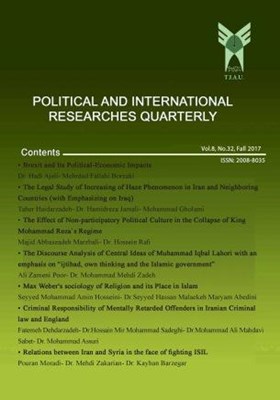Max Weber's sociology of Religion and its Place in Islam
Subject Areas : Political and International Researches Quarterly
Keywords: Religion, Islam, Sociology, Capitalism, Protestant Ethics, Calvinism,
Abstract :
Seyyed Mohammad Amin Hosseini- Seyyed Hassan Malaekeh, Ph. D- Maryam Abedini The central axis of Weber's sociology is the way of relationship between religious beliefs and social structures and the economy. Weber’s study is partially about economic organization of society, political systems, bureaucracy and themself rights is the normal sequence of sociology of religion. After rationalization of religion, the next issue is the tension between religious moral order and the everyday experiences of believers. If religion is not rationalized very much and still remained as magic issue, the possibility of resolving this tension is higher, because through summoning supernatural agents on a daily basis, the magic wards off the tensions. According to Weber, in "Sociology of Religions" the worldview and religious ethics are cultured and developed by certain groups and social benefits. He does not distinguish between religion and social group’s ideology. The main work of Weber in sociology of religions is to show that under which social circumstances, the prophet-like inspiration of one religion, firstly converted to a lifestyle of a social group and then through which tern to a main worldview of one civilization. There is a selective relationship between any religion and its bearer, therefore in the process of institutionalization of religion, the followers of that religion choose the characteristics of the religious ideas that they felt close relationship with them.
_||_

